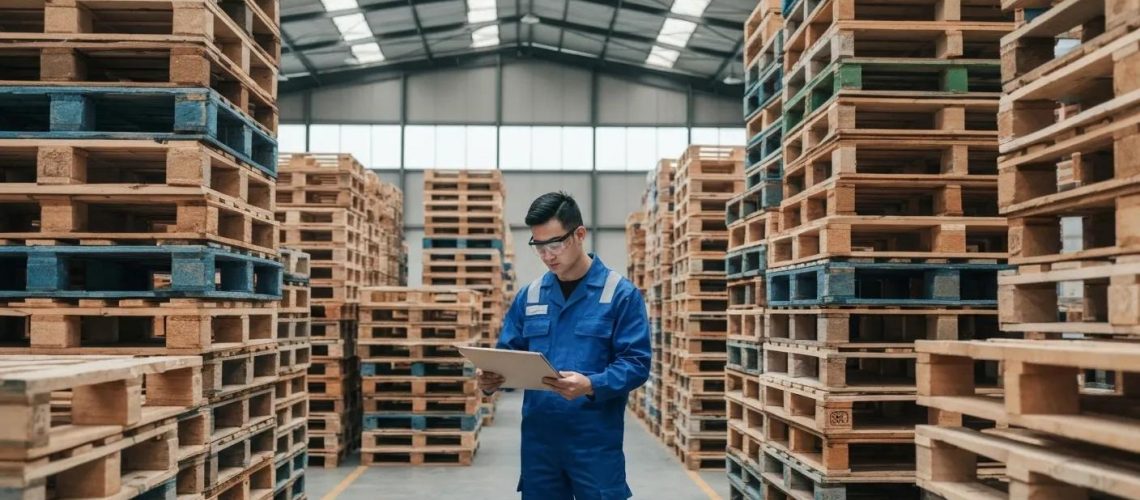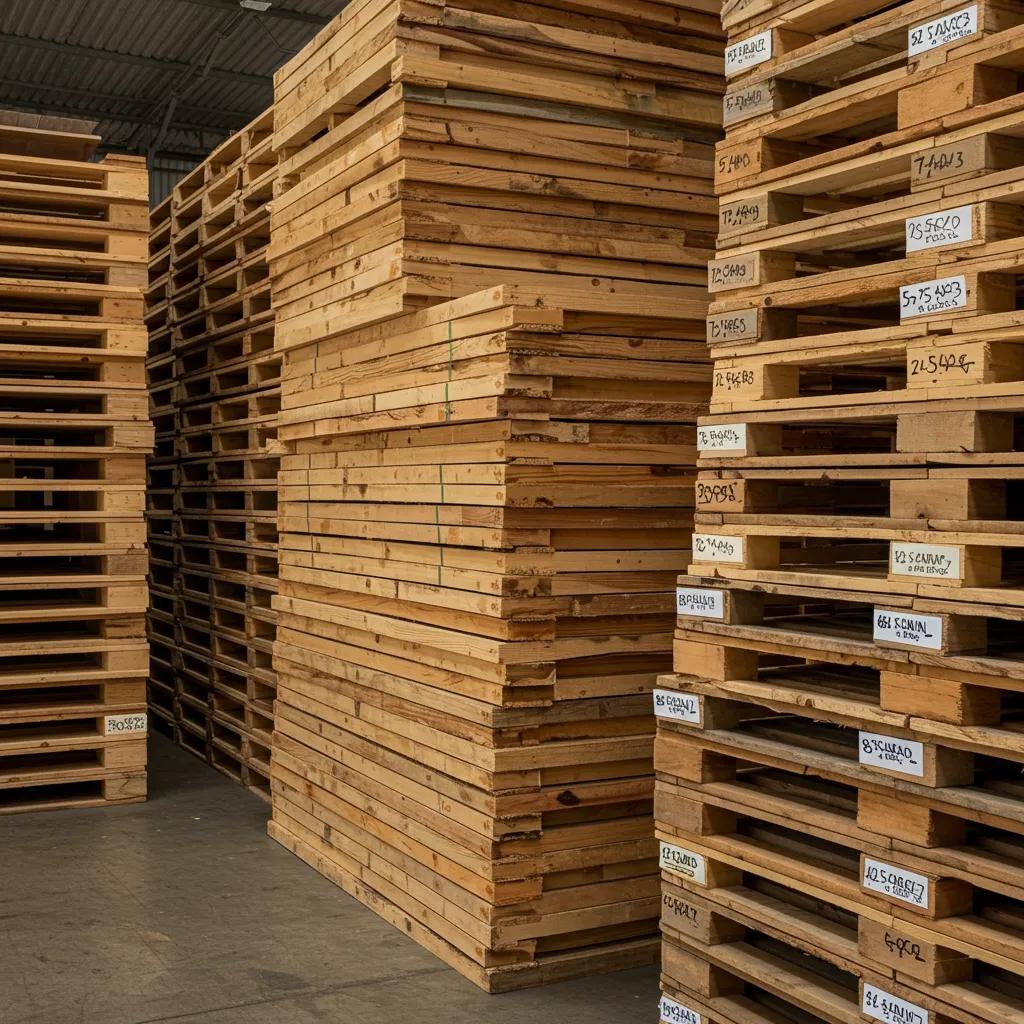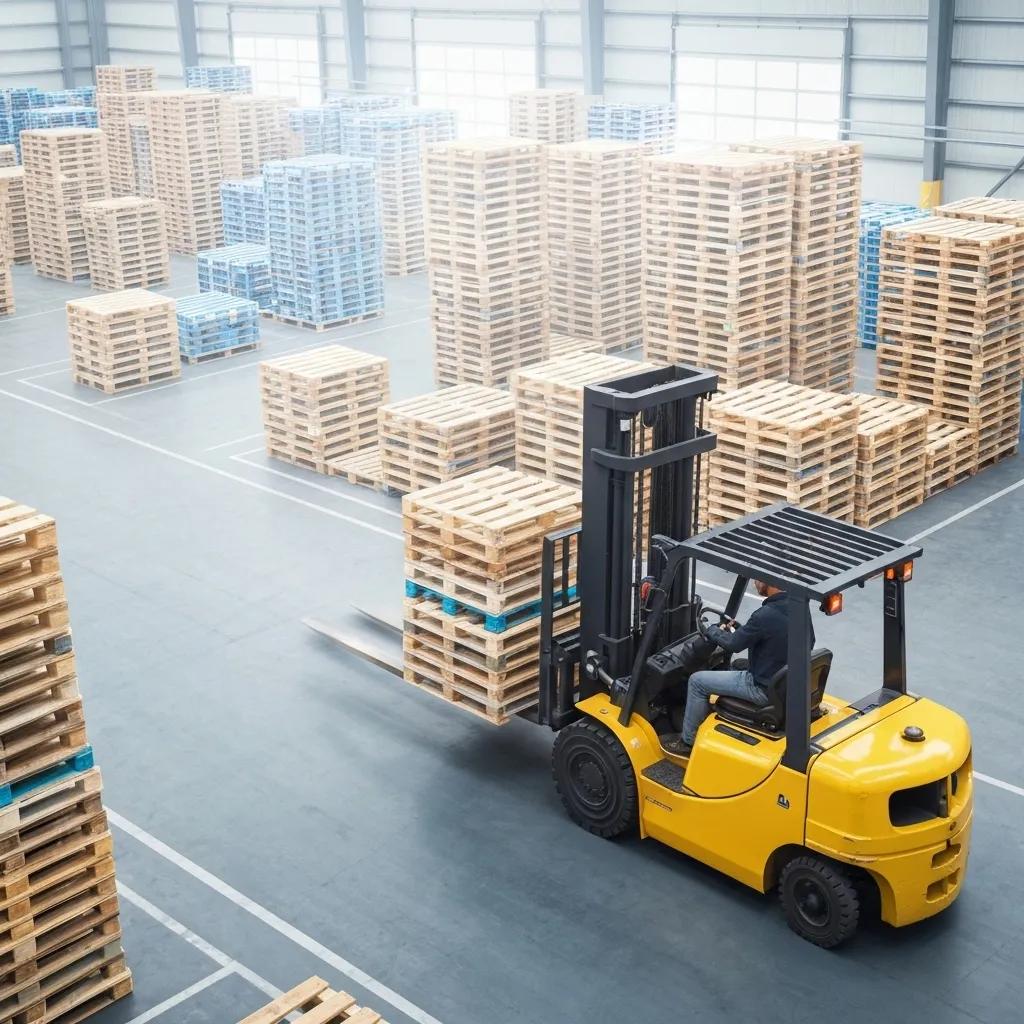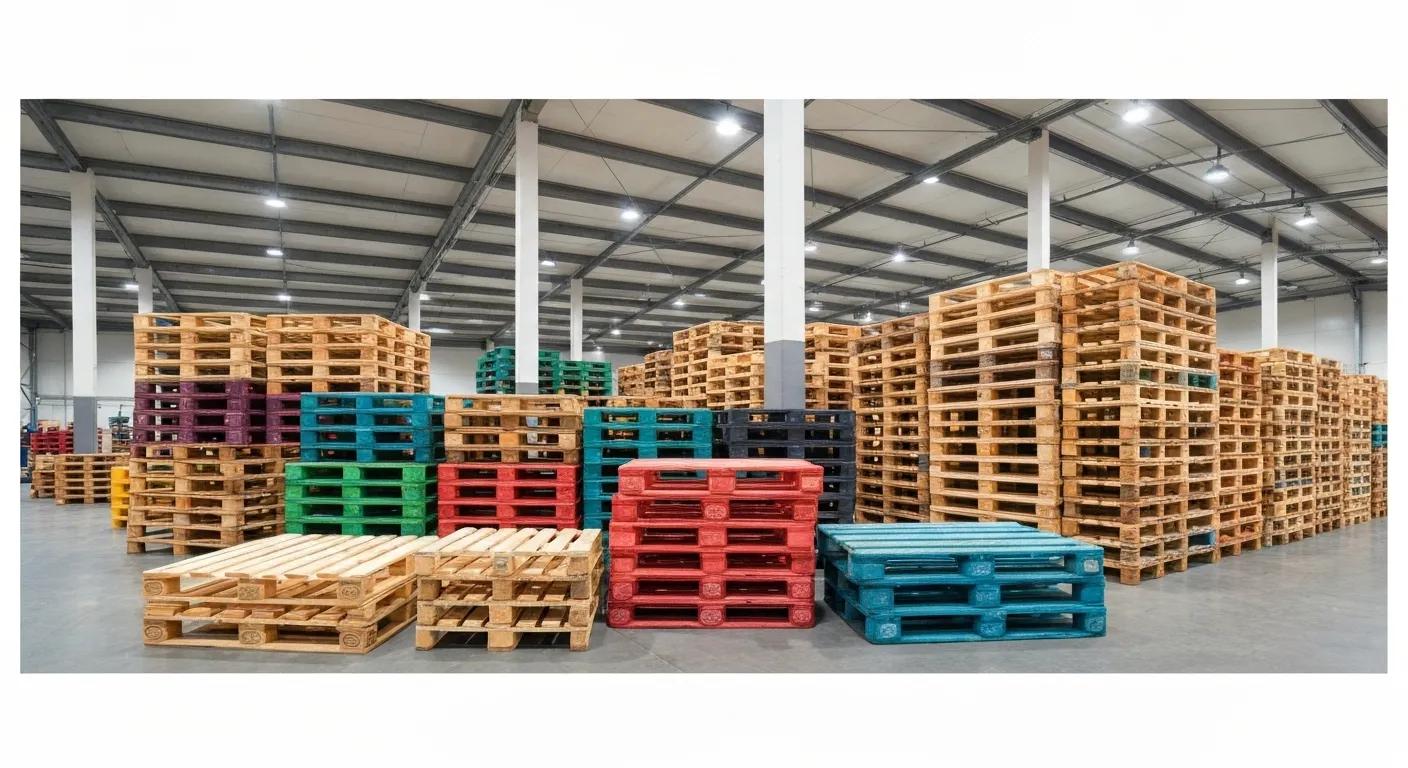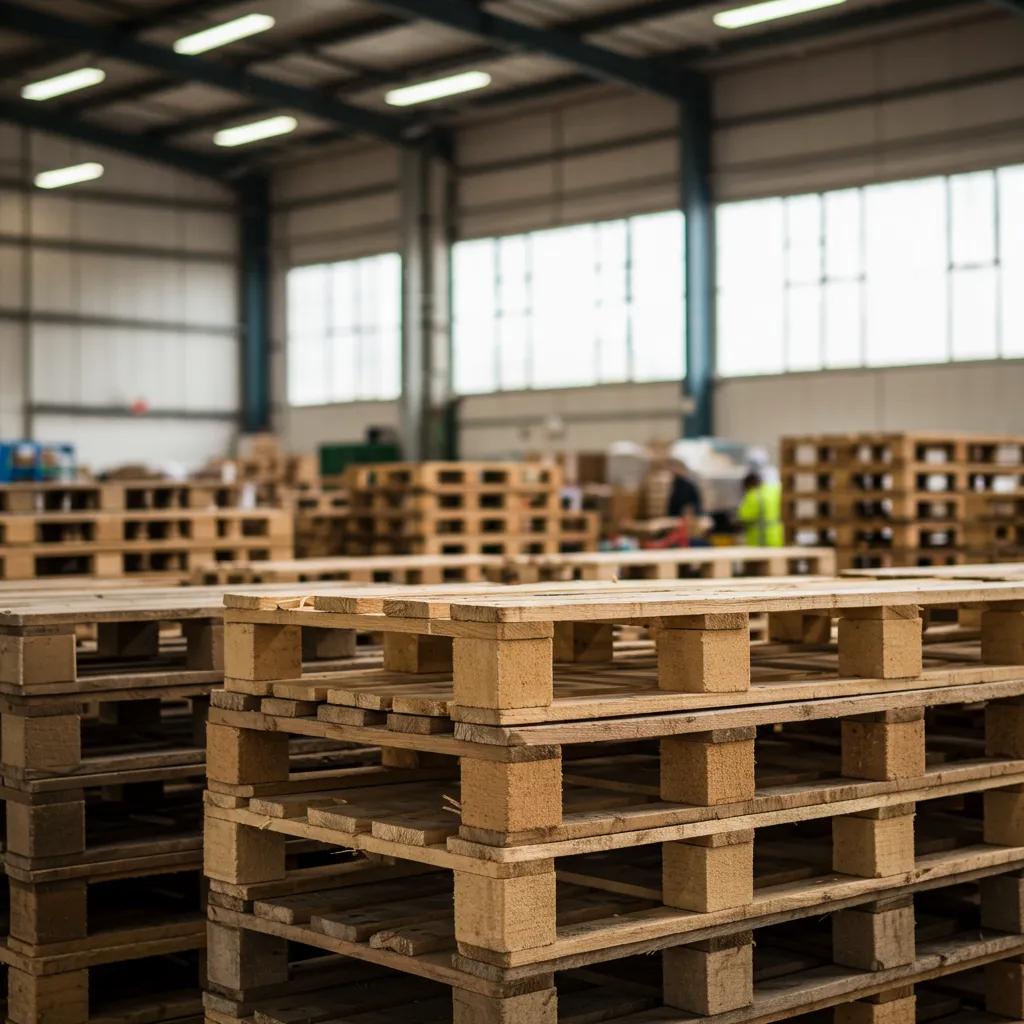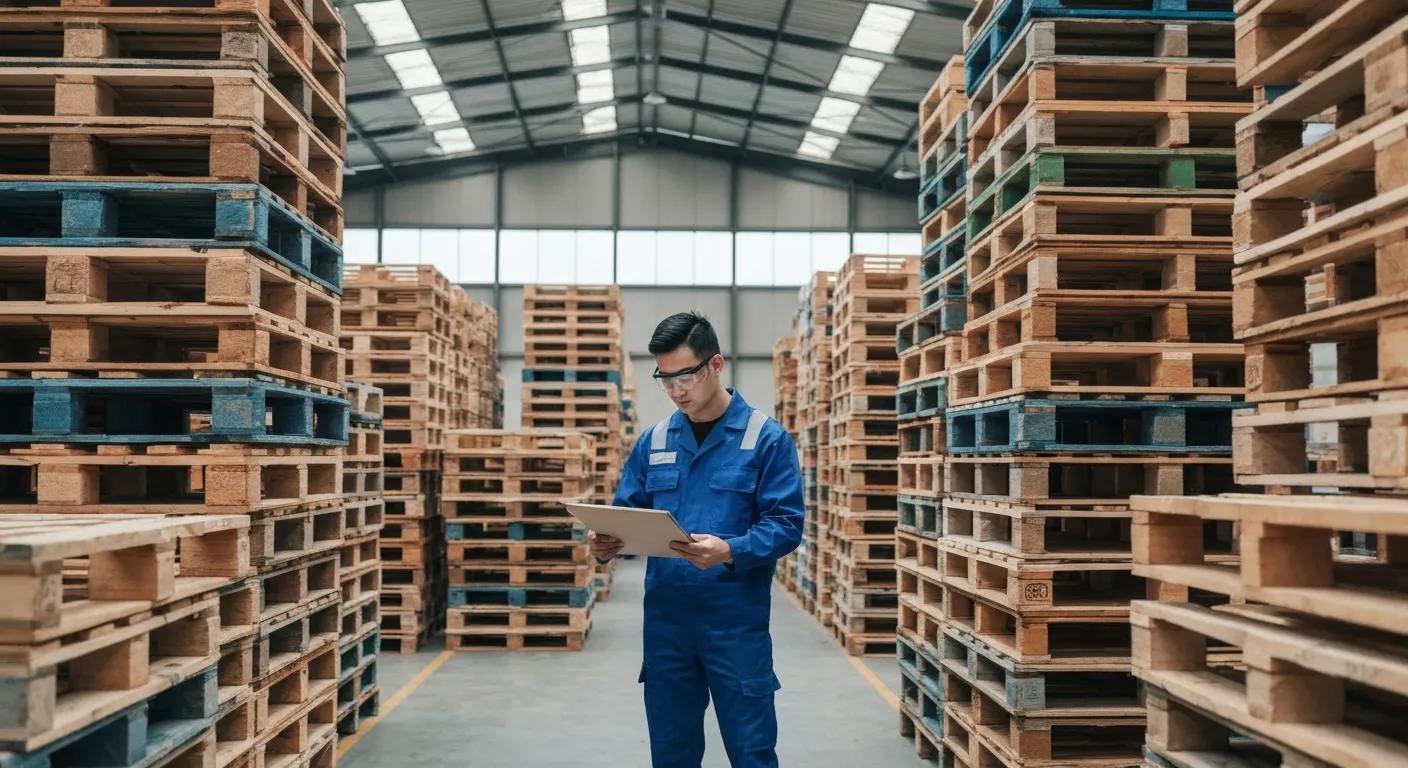
Pallet Supplier Near Me: What to Consider When Choosing Local Pallet Services
Selecting the right pallet supplier near you can make or break your logistics workflow by influencing delivery speed, compliance and cost efficiency. Facing inconsistent lead times, damage claims and hidden fees is a common pain for shipping managers and business owners. This guide defines the essential factors—pallet types, local accessibility, quality standards, sustainable solutions, pricing drivers, industry-specific options and evaluation criteria—to streamline your choice of a nearby pallet partner. You will learn how proximity speeds up replenishment, how certifications like ISPM-15 and GMA protect your shipments, and which eco-friendly programs can lower your environmental footprint while supporting cost savings. By the end, you’ll confidently evaluate local pallet services and connect with a supplier ready to meet your unique requirements.
What Types of Pallets Should You Consider from a Local Supplier?
Choosing among new, used, recycled, and custom designs ensures optimal load support, compliance and lifecycle costs. Understanding each condition and material lets you match pallets to your load weight, handling equipment and regulatory needs.
What Are the Differences Between New, Used, and Recycled Pallets?
New pallets are manufactured from fresh lumber to guarantee consistent strength and lifespan. Used pallets have served previous shipments and may show wear but cost 30–50 percent less. Recycled pallets are inspected, repaired and reconditioned to restore structural integrity at a mid-range price point.
| Condition | Durability | Cost Impact |
|---|---|---|
| New | High initial load capacity | Premium pricing for consistency |
| Used | Variable based on wear | Budget-friendly but limited life |
| Recycled | Restored to industry grade | Balanced cost and reliability |
Each condition delivers distinct trade-offs between upfront expense and long-term performance, guiding your choice based on budget and usage frequency.
How Do Wood Pallets Compare for Your Business Needs?
Wood pallets are cost-effective and easily repaired, offering strong load-bearing capacity for general goods.
| Material | Characteristic | Operational Benefit |
|---|---|---|
| Wood | High strength-to-cost ratio | Ideal for heavy loads and repairs |
Material selection impacts handling methods, sanitation standards and lifecycle costs, so choose the option aligned with your storage environment and compliance requirements.
What Are Custom Pallets and When Should You Choose Them?
Custom pallets are tailor-made to non-standard dimensions, specialty loads or automation systems. They are crafted with specified stringer spacing, reinforced blocks or integrated skids to support irregular shapes or delicate equipment.
- Choose custom designs when your products exceed standard 48×40 inches or require specialized materials.
- Opt for reinforced decks if you handle heavy machinery or steel coils.
- Specify food-grade lumber for sanitary shipping.
Custom solutions eliminate voids and damage, optimizing space utilization and reducing load shifts in transit.
Why Are GMA and Heat-Treated Pallets Important for Shipping Compliance?
GMA pallets conform to a 48×40-inch footprint set by grocery and retail industries, ensuring seamless handling across distribution centers. Heat-treated pallets meet ISPM-15 pest-control standards by baking wood at 56 °C for 30 minutes, preventing invasive species spread.
- GMA standardization minimizes forklift misalignment and packaging overhang.
- Heat treatment avoids customs holds and fumigation fees when exporting internationally.
Adhering to these protocols safeguards your supply chain from delays and inspection penalties, making compliance a strategic advantage.
Pallet Standards and Compliance
Adhering to standards like ISPM-15 and GMA is crucial for avoiding delays and penalties in the supply chain. ISPM-15, for example, mandates heat treatment of wood pallets to prevent the spread of invasive species, while GMA standards ensure compatibility within the grocery and retail industries.
International Plant Protection Convention (IPPC), Guidelines for Regulating Wood Packaging Material in International Trade (2009)
This research supports the importance of adhering to international standards for pallet treatment and construction to ensure smooth trade operations.
How Does Local Accessibility Impact Your Pallet Supply Chain?
Proximity to a local pallet supplier reduces transit time and freight expense while improving responsiveness to urgent orders. A nearby partner becomes an extension of your team, providing on-demand inventory replenishment and service flexibility.
What Are the Benefits of Choosing a Pallet Supplier Near You?
Opting for a local supplier delivers three core benefits:
- Faster lead times through next-day delivery or same-day pickup.
- Lower transportation costs by cutting backhaul and fuel surcharges.
- Personalized service that adapts to your scheduling and handling requirements.
These advantages translate into fewer stockouts and minimized downtime, directly boosting your operational efficiency.
Benefits of Local Pallet Suppliers
Choosing a local pallet supplier offers advantages such as faster lead times, reduced transportation costs, and personalized service. These benefits translate into improved operational efficiency by minimizing stockouts and downtime, which are critical for maintaining a smooth supply chain.
Council of Supply Chain Management Professionals, Supply Chain Management Terms and Glossary (2013)
This research highlights the advantages of localized supply chains, which aligns with the article’s emphasis on the benefits of using a local pallet supplier.
How Does Local Delivery and Pickup Improve Logistics Efficiency?
Local delivery and pickup services use dedicated routes and flexible scheduling to synchronize pallet movements with your production or shipping calendar.
| Service Option | Characteristic | Efficiency Gain |
|---|---|---|
| Scheduled Delivery | Fixed time windows | Reduces waiting time at dock |
| On-Demand Pickup | Same-day collection | Clears used pallets swiftly |
By aligning pallet exchange with peak workload periods, you avoid storage congestion and maintain a continuous flow of materials.
What Should You Know About Service Areas and Availability?
Service maps define where providers stock inventory and dispatch vehicles, and business hours dictate when orders can be placed. Evaluate:
- Minimum order quantities by zone.
- Emergency order surcharges for off-hour requests.
- Seasonal coverage fluctuations in remote regions.
Predictable service radius and transparent availability parameters ensure you never face surprise gaps in your pallet supply.
What Are the Key Quality and Compliance Standards for Pallets?
Industry benchmarks and certifications guarantee that pallets meet safety, dimensional and phytosanitary requirements, reducing damage risks and legal liabilities.
What Is ISPM-15 Certification and Why Does It Matter?
ISPM-15 certification requires wood pallets to undergo heat treatment or fumigation, eliminating pests and pathogens. This process prevents the spread of invasive species across borders and satisfies international plant health regulations. Certified pallets avoid inspection delays at customs and uphold your reputation as a compliant exporter.
How Do GMA Pallets Meet Industry Standards?
GMA pallets are built to a 48×40-inch layout with precise board thickness and block spacing to support grocery and consumer goods logistics. Their consistent dimensions enable standardized racking systems and automated pallet conveyors, reducing jams and handling errors.
How Can You Verify Pallet Quality and Load Capacity?
Inspect structural elements—deck boards, stringers and blocks—for cracks, rot or missing fasteners. Confirm load ratings stamped on the pallet or provided in technical data sheets.
- Measure maximum static load capacity printed on the pallet.
- Check for certification logos indicating compliance.
- Conduct a visual safety inspection before each shipment.
Rigorous verification prevents on-route failures and ensures your products remain secure.
How Can Sustainable Pallet Solutions Benefit Your Business?
Recycled and remanufactured pallets lower raw material use, cut disposal fees and demonstrate environmental stewardship that resonates with eco-conscious customers.
What Are the Advantages of Pallet Recycling Programs?
Recycling programs collect spent pallets, repair damaged boards and restore them to quality standards. Key advantages include:
- Cost savings of up to 40 percent versus purchasing new pallets.
- Reduction in landfill contributions and wood waste.
- Access to buyback credits that offset future pallet purchases.
Engaging in recycling loops enhances your corporate social responsibility and reduces your overall supply chain footprint.
How Do Recycled Pallets Support a Circular Economy?
Recycled pallets extend the lifecycle of wood resources by keeping them in continuous service.
| Process | Environmental Impact | Business Benefit |
|---|---|---|
| Collection | Diverts wood from landfills | Lowers disposal costs |
| Reconditioning | Reduces virgin lumber demand | Strengthens sustainable branding |
| Redistribution | Promotes reuse cycles | Creates recurring revenue streams |
By closing the loop, you reinforce sustainable practices that attract partnerships and regulatory incentives.
What Buyback and Recycling Services Should You Expect from Suppliers?
An end-to-end recycling partner will:
- Provide on-site pallet removal and credit issuance.
- Offer sorting by grade and condition to maximize reuse.
- Supply replacement pallets aligned to your operational needs.
These services free you from disposal logistics and convert retired pallets into financial returns.
What Pricing Factors Should You Consider When Buying Pallets Near You?
Transparent pricing hinges on pallet type, condition, delivery terms and ancillary fees, enabling you to budget accurately and avoid surprises.
How Do Pallet Types and Conditions Affect Pricing?
Pallet costs vary widely by material, build quality and refurbishment level.
| Pallet Type | Condition | Typical Price Range (USD) |
|---|---|---|
| Wood GMA | New | $15–$25 |
| Wood GMA | Used | $7–$12 |
Understanding these ranges helps you select the right balance of quality and cost.
What Hidden Costs Should You Be Aware Of in Pallet Purchasing?
Beyond the base price, factor in:
- Delivery surcharges for remote zones.
- Service fees for pallet sorting or emergency restocking.
- Storage charges for long-term pallet custody.
Accounting for these elements ensures you capture the true landed cost of each pallet.
How Can You Save Money with Local Pallet Suppliers?
Leverage cost-saving opportunities such as:
- Bulk orders to unlock volume discounts.
- Recycling credits through buyback programs.
- Contracted delivery schedules to waive rush fees.
Strategic partnerships with a nearby supplier maximize budget efficiency and operational reliability.
How Do Industry-Specific Pallet Solutions Meet Unique Business Needs?
Specialized sectors demand pallets built for regulatory compliance, hygiene standards or automation compatibility to protect goods and streamline handling.
What Pallet Types Are Best for Food and Beverage Logistics?
Food and beverage shipments require pallets made of heat-treated wood that resist moisture and microbial growth. Hygienic designs minimize crevices where contaminants accumulate and comply with USDA and GMP guidelines.
How Are Pallets Customized for Pharmaceutical Shipping?
Pharmaceutical pallets incorporate traceability features such as QR codes and RFID tags, along with closed-deck surfaces for sterile environments. These designs uphold FDA and EMA regulations by ensuring chain-of-custody visibility and contamination control.
What Pallets Optimize E-commerce and Retail Supply Chains?
E-commerce operations benefit from lightweight block-style wood pallets that save transit space and accelerate conveyor throughput. Standardized footprints and consistent heights integrate seamlessly with automated picking systems.
How Can You Evaluate and Choose the Right Pallet Supplier Near You?
A systematic assessment of supplier capabilities, service levels and reputation secures a partnership aligned with your performance goals.
What Criteria Should You Use to Assess Pallet Supplier Reliability?
Evaluate reliability based on:
- Inventory breadth covering new, used, recycled, and custom pallets.
- Certifications such as ISPM-15 and GMA compliance.
- Lead times for standard and rush orders.
- Equipment for pickup and delivery handling.
These criteria guarantee consistent supply and minimize unexpected shortfalls.
How Important Is Customer Service and Responsiveness?
Responsive customer service ensures rapid resolution of urgent issues, from expiring pallets to last-minute order changes. Clear communication channels and dedicated account support reinforce trust and operational agility.
What Are the Steps to Order, Receive, and Manage Pallet Deliveries?
- Request Quote – Provide pallet type, quantity and delivery window.
- Confirm Order – Agree on pricing, lead time and service terms.
- Schedule Delivery – Lock in date and time with dispatch team.
- Receive and Inspect – Verify condition upon arrival and sign acceptance.
- Arrange Pickup – Return used pallets for recycling or credit.
Following these steps delivers a predictable, end-to-end pallet lifecycle with your local supplier.
Where Can You Find Reviews and Testimonials for Local Pallet Suppliers?
Seek validation on:
- Industry forums and logistics communities.
- Business listings with star ratings and verified user feedback.
- Case studies published on supplier websites highlighting performance metrics.
Social proof from peers reinforces confidence in selecting a nearby pallet partner.
Your Trusted Pallet Partner in Plant City
For over 30 years, we’ve been a cornerstone of the Plant City industrial community, proudly serving clients in Tampa, Lakeland, and the surrounding areas. Our strategic location right on HWY 92 places us in close proximity to the numerous large warehouses and Amazon facilities visible from I-4, ensuring efficient and timely service for all our industrial partners.
We are dedicated to supplying the highest quality pallets tailored to the unique needs of each business. Our commitment to excellence and deep understanding of local industrial requirements make us the ideal choice for your pallet supply needs.
Get a Custom Pallet Solution Today!
Chris Steele and David Lacy are ready to provide personalized quotes and exceptional customer service. Let us help you optimize your logistics with the best pallet solutions.
Choosing a nearby pallet supplier that offers diverse inventory, proven compliance standards and sustainable services will streamline your operations and reduce costs. By assessing types, accessibility, quality protocols, pricing factors and industry alignment, you establish a resilient supply chain foundation. Local delivery, recycling programs and custom solutions transform pallets from a basic asset into a strategic enabler. Reach out today to align your logistics with a partner committed to reliability, efficiency and environmental stewardship.

